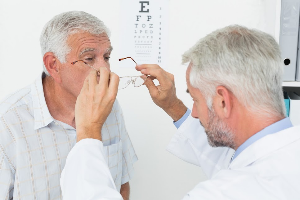Each day, you have a chance to view new things and explore the world around you with fresh eyes. But if everything you see appears hazy or distorted, even after you sleep through the night or rest your eyes, it’s easy to feel frustrated.
Unless you already have problems with your eyes or health, you may not know exactly why you have blurry vision in the first place. The uncertainty of not knowing why your vision blurs can baffle and discourage you. The following information can help clear up a few things about your hazy vision and what you can do to overcome it.
Possible Causes and Consequences of Your Hazy Eyes
Hazy vision (also known as blurry or blurred vision) can occur alone or as a symptom of an underlying vision or health condition. It affects children and adults of all ages. If you have hazy vision, you don’t see objects in their entirety. Instead, the objects around you might lack distinct shapes or forms.
In some cases, objects sitting side by side or close to each other appear as one colorful or grayish blotch. The lack of detail can be dangerous, especially when you drive your vehicle, handle medications or operate machinery. For example, if you cannot read the labels on your medication bottles, it’s easier to confuse two different medications that serve different purposes.
A number of things can lead to hazy vision, including health problems that damage eyes’ nerves and cells. Some conditions like multiple sclerosis can initially develop with very subtle symptoms but cause significant damage to your eyes over time. The most common symptom for these types of diseases is blurry vision.
Other health problems may not be so subtle, including diabetes, which affects the blood sugar levels in your body. Diabetes weakens the tissues that support your eyes, or it can cause fluids to leak into the tissues of your eyes and distort your vision. Your regular doctor might not catch the problems in your eyes right away, especially if they place most of their focus on lowering your blood sugar levels.
Hidden eye problems like refractive errors can also lead to hazy vision. Refractive errors range from myopia (nearsightedness) to presbyopia (age-related vision loss). It is extremely important that you correct refractive eye errors as soon as possible to reduce the symptoms they cause. Many people develop painful headaches and eyestrain from untreated refractive errors of the eyes.
Glaucoma, macular degeneration and a detached retina are other possible vision problems that cause hazy eyes. A detached retina requires emergency surgery to treat.
Treatments and Solutions for Your Hazy Eyes
Finding out why you have blurry vision is essential. If you have not taken steps to see an optometrist or ophthalmologist yet, do so now. Eye specialists like those at Absolute Vision Care offer many treatment options to adults and children experiencing hazy eye problems.
One of the first things an eye specialist may do is check you for an underlying medical condition. You may need to see a regular doctor for an exam that includes testing your blood and urine for abnormal cells or other signs of disease. Some eye doctors examine their patients themselves, so be sure to discuss this option with your eye specialist.
You will also undergo an extensive eye exam during your treatment. If your eye doctor finds a problem, they may choose coordinate your care with a regular doctor. In addition, your eye doctor may correct your vision problem with eyeglasses, contact lenses or vision therapy. Vision therapy retrains your eyes to focus on objects better. If your hazy vision becomes worse, surgery to correct the damage may be an option.
Whether you’ve experienced hazy vision for a while or you’ve only recently started to notice the symptoms, get in touch with our eye doctors as soon as you can.




